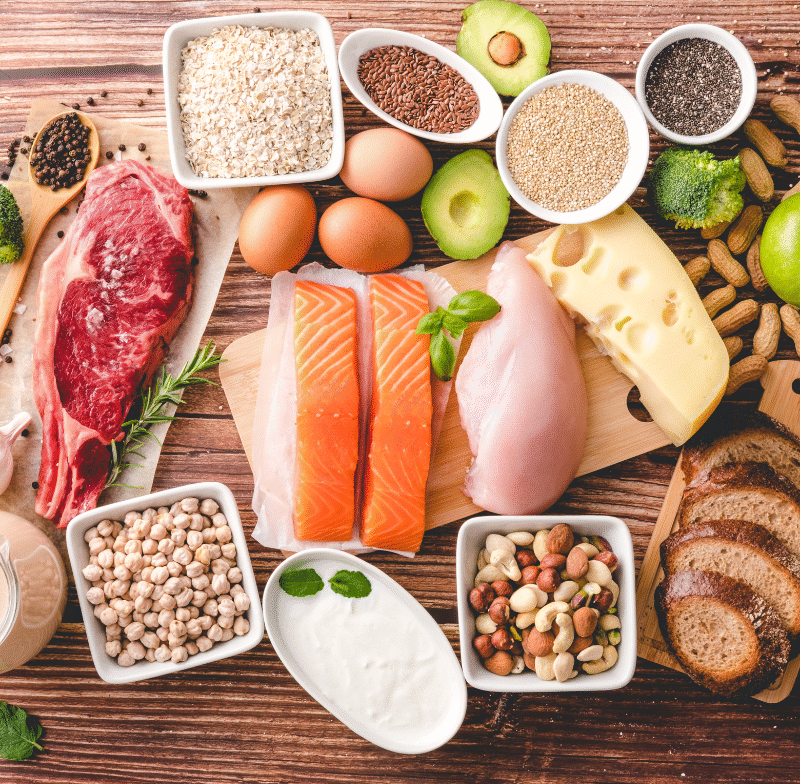The carnivore diet is an all-animal-based way of eating that focuses solely on meat, fish, eggs, and select dairy products while eliminating all plant-based foods, including fruits, vegetables, grains, and legumes. Proponents of this diet believe that humans thrive on animal products alone, arguing that it can lead to better health, weight loss, and reduced inflammation. This diet is similar to keto but takes things a step further by completely cutting out carbohydrates.
What Can You Eat on the Carnivore Diet?
Since the carnivore diet eliminates all plant-based foods, it centres around consuming high-quality animal products. Here’s a breakdown of the main food categories:
Beef, Chicken, Lamb, Pork, and Turkey
Red meat is the foundation of the carnivore diet. Beef, lamb, and pork provide essential protein and fats, along with vital nutrients like iron, B vitamins, and zinc. Popular cuts include ribeye, sirloin, brisket, and ground beef. Poultry like chicken and turkey is also included, though it is leaner and often paired with higher-fat meats for balance. Lamb is a rich source of omega-3s and conjugated linoleic acid (CLA), which supports metabolism and immune function.
Organ Meats Like Liver and Oxtail
Organ meats are nutrient powerhouses and an essential part of a well-rounded carnivore diet. Liver, for example, is packed with vitamin A, B vitamins, iron, and copper. Oxtail, rich in collagen and gelatin, supports joint and gut health. Other organ meats like heart, kidney, and tongue provide unique nutrients often lacking in muscle meats.
Fish: Oily and White Fish Like Salmon, Trout, Mackerel, Sardines, Crab, Lobster, Tilapia, and Herring
Fatty fish like salmon, mackerel, sardines, and herring are excellent sources of omega-3 fatty acids, which are crucial for brain and heart health. White fish like tilapia and trout provide lean protein and essential minerals like selenium and iodine. Shellfish such as crab and lobster offer high-quality protein, zinc, and other trace minerals. Regular consumption of seafood supports overall health, making it a valuable part of the carnivore diet.
Eggs: Chicken and Duck
Eggs are a nutrient-dense food, rich in high-quality protein, healthy fats, and essential vitamins like choline, which support brain function. Duck eggs contain more fat and protein than chicken eggs, making them a great choice for those looking to increase calorie intake. Eggs can be eaten boiled, scrambled, fried in butter, or incorporated into carnivore-friendly recipes.
Dairy: Hard Cheese, Butter, and Cream
While some strict carnivores avoid dairy, many include hard cheeses, butter, and heavy cream. Hard cheeses like cheddar and parmesan are low in lactose and provide calcium and protein. Butter and cream add healthy fats that enhance satiety and support ketosis, a state where the body burns fat for fuel. Dairy should be consumed in moderation, as some people may have sensitivities.
How to Cook on the Carnivore Diet
Cooking on the carnivore diet is simple, as meals are focused on whole animal products. Here are the best methods to prepare carnivore-friendly foods:
- Grilling: Great for steaks, chicken, lamb chops, and fish. It enhances the natural flavours of meat without requiring plant-based seasonings.
- Pan-frying: Cooking in butter, tallow, or lard adds rich flavour and increases fat intake. Cast-iron skillets work best.
- Slow-cooking: Ideal for tougher cuts like brisket, oxtail, and pork shoulder, making them tender and flavorful.
- Boiling: Best for organ meats and fish. Bone broth, made from boiling bones and connective tissue, is highly nutritious.
- Raw or lightly seared: Some carnivores eat raw or rare meat to preserve nutrients and enzymes. However, food safety is essential, and sourcing high-quality meat is crucial.
How Does the Carnivore Diet Work?
The carnivore diet is based on the idea that the human body functions best when fueled exclusively by animal-based nutrients. By eliminating carbohydrates, the body shifts to using fat for energy, leading to ketosis and stable blood sugar levels. The diet is also anti-inflammatory, as it removes potentially problematic plant compounds like lectins, oxalates, and phytates.
How to Follow the Carnivore Diet
To start the carnivore diet, simply eliminate all plant-based foods and focus on eating animal products. Here are key guidelines:
- Prioritize fatty meats: Ribeye, brisket, pork belly, and lamb chops provide the necessary fats to maintain energy.
- Eat when hungry: There are no strict meal times; eat until full and listen to your body’s signals.
- Stay hydrated: Drink plenty of water, bone broth, and electrolytes to avoid dehydration.
- Avoid processed meats: Stick to fresh, unprocessed cuts of meat to avoid additives and preservatives.
- Limit dairy if needed: Some people find dairy causes inflammation or digestive issues, so monitor your tolerance.
Is the Carnivore Diet Good for You?
The carnivore diet is highly debated in the nutrition world. Advocates claim it improves digestion, mental clarity, energy levels, and weight loss. Opponents argue that cutting out all plant foods may lead to nutrient deficiencies and long-term health risks.
What Evidence Supports the Carnivore Diet?
Scientific studies on the carnivore diet specifically are limited, but evidence supporting low-carb, high-protein diets suggests benefits like:
- Weight loss: A high-protein diet helps reduce appetite and increase metabolism.
- Reduced inflammation: Eliminating processed foods and plant toxins may decrease inflammation markers.
- Improved insulin sensitivity: Low-carb diets help regulate blood sugar levels.
Anecdotal reports also highlight improvements in autoimmune conditions, mental health, and digestive disorders. However, more research is needed.
Are There Health Benefits?
Supporters of the carnivore diet claim it helps with:
- Weight loss: By eliminating carbohydrates, the body burns fat for fuel, reducing cravings.
- Improved digestion: Many people report relief from bloating, IBS, and food intolerances.
- Mental clarity: A diet rich in fats and protein may enhance brain function.
- Reduced inflammation: The absence of plant compounds like lectins and oxalates may benefit autoimmune conditions.
What Are the Downsides?
Despite the benefits, the carnivore diet has potential downsides:
- Nutrient deficiencies: The diet lacks fibre, vitamin C, and certain plant-based antioxidants.
- Digestive changes: Some experience constipation due to a lack of fibre, though increased fat intake can help.
- Social limitations: Eating out and attending social events can be challenging.
- Sustainability concerns: The diet may be difficult to maintain long-term due to its restrictive nature.
Does the Carnivore Diet Help with Weight Loss?
Yes, the carnivore diet can support weight loss by:
- Reducing calorie intake naturally: Protein and fat are highly satiating, leading to reduced overall consumption.
- Eliminating processed foods and sugar: This reduces cravings and blood sugar spikes.
- Boosting metabolism: Protein has a higher thermic effect, meaning the body burns more calories digesting it.
Final Thoughts on the Carnivore Diet
The carnivore diet is an extreme approach to nutrition that focuses exclusively on meat, fish, eggs, and select dairy products while eliminating all plant-based foods. While it may provide benefits like weight loss, reduced inflammation, and improved digestion, it is also highly restrictive and lacks certain micronutrients. If considering this diet, it’s essential to listen to your body, consult with a healthcare professional, and ensure you’re consuming a variety of animal-based foods for optimal nutrition.
Featured Image by Виктория from Pixabay
Discover more from Beardy Blogger
Subscribe to get the latest posts sent to your email.



[…] For a similar post from me, see What Is the Carnivore Diet? […]